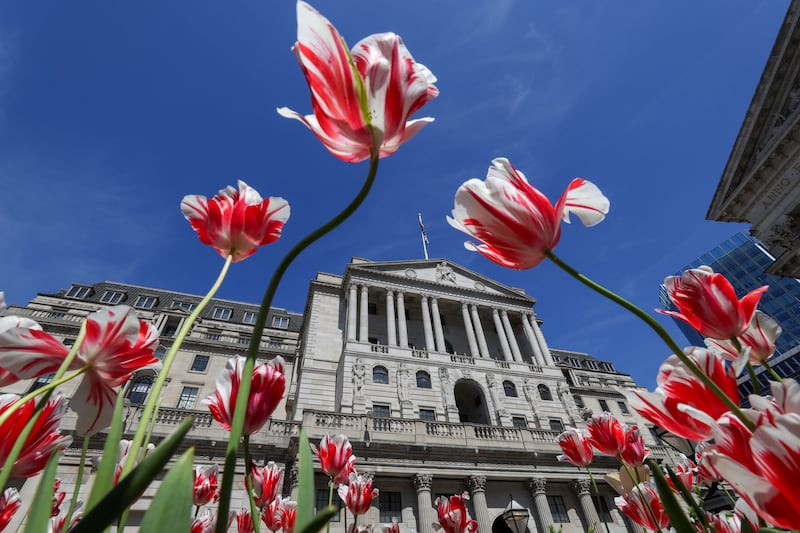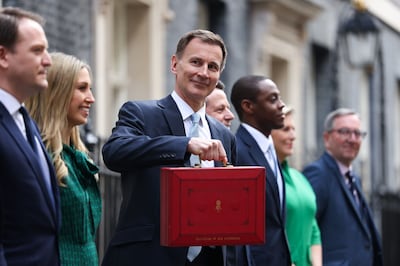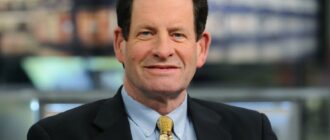No rate reductions until August and the NIESR now predicts the next British government will have to raise taxes

Matthew Davies LondonListen In EnglishListen in ArabicPowered by automated translation
A leading British think tank on Thursday said it does not expect the Bank of England to lower interest rates until August, despite the “continued anaemic growth trend” of the UK economy.
The National Institute of Economic and Social Research forecast only two interest rate cuts this year, to settle at 4.75 per cent, reflecting a “cautious unwinding of monetary policy given the upside risks posed by persistent core inflation, elevated wage growth and geopolitical challenges”.
Read MoreInterest rates: Credit crunch holding back UK housing market
With the Bank of England set to deliver its latest decision on Thursday, others were more optimistic.
Investment strategists Bill Papadakis and Luca Bindelli at Lombard Odier expect a 1 per cent fall in interest rates by the end of the year, to 4.25 per cent.
The cutting will possibly start in June, “with a weakening labour market expected to bring down wage growth and high services inflation”, they said.
But others see the Bank of England as having far more hawks than doves, and say turning the one into the other on the Monetary Policy Committee (MPC) will be a much longer process than some are forecasting.
“There is no chance the Bank of England will cut rates this summer,” Samuel Mather-Holgate, independent financial adviser at Mather and Murray Financial told Newspage.
“Their decisions have confirmed that they are not forward looking and will only respond once inflation is below target. This means there will only be one cut this year, and that’s bad news for the UK businesses, households and the broader economy.”
Inflation to drop below target
The NIESR also expects inflation in Britain to fall below the Bank of England’s 2 per cent target in April driven by a fall in the energy price cap. But for inflation to stay around the target, the stubborn core inflation figure will have to fall by much more than it has so far.
The Consumer Prices Index rose by 3.2 per cent rose in March, down from 3.4 per cent in February, figures compiled by the Office for National Statistics show.
But core inflation (which strips out energy and food), was still stubbornly higher at 4.2 per cent in March, down from 4.5 per cent in February.
While the Bank of England is not expected to move interest rates from the current 5.25 per cent on Thursday, some expect the MPC to take the opportunity to reduce its inflation forecast and be somewhat more optimistic in its outlook.
“It’s possible that another member [of the MPC] joins Swati Dhingra and votes for a cut,” said Steven Bell, chief economist, Europe, Middle East and Africa, at Columbia Threadneedle Investments.
“The big factor causing hesitation is the prospect that the 10 per cent hike in the minimum wage, which took effect last month, will lead to a broader increase in wage inflation. Yes, the three-month on three-month rate will rise but that should be a one off.”
On economic growth, the NIESR forecast GDP growth of 0.8 per cent in 2024, higher than recently downgraded forecasts from the OECD and the IMF. Nonetheless, the NIESR said “geopolitical risks from the conflict in the Middle East present substantial downside risk” and that “the trend growth rate of UK GDP is only 1 per cent”.
The think tank also said the winner of the next UK general election, expected later this year, will have to raise taxes simply to maintain the current levels of public service spending. In addition, the current Conservative government has no “fiscal headroom” to make any further tax cuts before the election.
“Despite the welcome fall in inflation, UK growth remains anaemic,” said Prof Stephen Millard, deputy director for macroeconomic modelling and forecasting at the NIESR.
“This will make it difficult for any incoming government to carry out the much-needed investment in infrastructure and the green transition, as well as increase spending on public services and defence, without either raising taxes or rewriting the fiscal rules.
“This makes clear the need to reform the fiscal framework to enable the government to do what is needed for the economy in a fiscally sustainable way.”

Jeremy Hunt, UK chancellor of the exchequer, departs 11 Downing Street to present his budget to parliament in March. Bloomberg
‘Change the fiscal framework’
What that would mean is a complete overhaul of the fiscal rules, which were laid down in the late 1990s, whereby governments only borrow to invest and not to fund current spending (better known as the ‘golden rule’), and that the ratio of public sector net debt to GDP would not exceed 40 per cent of GDP.
The trouble is, successive governments have broken the debt to GDP ratio rule since the 2008 global financial crisis and now it now sits at around 98 per cent.
So, the logic becomes: rather than battling to win a losing game, change the rules of the game itself given that, as the NIESR points out, the rules inadvertently prevent good fiscal decision-making by “constraining the public investment needed to improve economic growth and ensure the United Kingdom meets its net zero target by 2050″.
“We are currently missing fiscal targets,” Prof Millard said.
“If you want to hit the fiscal target, you have to literally raise taxes. The most efficient way of doing that is through sticking a penny or two or three on income tax.
“I don’t think they should do that though. I think what they should do is change the fiscal framework.
“It’s the targets that are creating the problem; it’s the targets that are forcing governments to put brakes on the economy. If those targets weren’t there, we could have the additional public investment, and we could have more targeted support for lower income households.
“They need to change the framework. That’s the message.”
Updated: May 08, 2024, 11:01 PM










